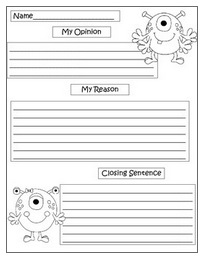- Before reading this chapter I must admit that book logs really didn't hold value for me. However Serravallo walks you through how to analyze your book logs to get insight on your students.
- She also gives great questions to ask yourself as you analyze both the book logs and reading interest inventory. Example: "Is the student able to name a genre, author, or type of book that is a good fit?"
- It's important to know how deep a student's work is within a particular comprehension skill. (I listed the skills in last week's post.) Strategy you could use: Ask students to respond to a prompt you prepare for a read aloud on a post it. Sort the answers accordingly: Basic in one pile, on target in another and more sophisticated in a third pile. This strategy would be easy to implement and allows you to see immediately who needs to go deeper.
- When analyzing whole book comprehension you want to look for a student's understanding of main idea, key details, vocabulary, and text features. Serravallo gives several examples of questions to ask for each and what the ideal answer.
- Fluency cannot be overlooked. It is directly linked to comprehension. Example Question: Does the student read with automaticity?
- Don't be afraid to infer when analyzing miscues. Be careful not to look for deficits, but for a strength. Example Question: When a student self corrects what cueing system is he using?
- Analyzing Conversation: I had an epiphany in this section....use those iPads, iPhone, etc to record student conversation so you can go back and analyze. I will be encouraging my teachers to start doing this. LOVE it!!
- Analyzing Narrative writing....FOCUS, FOCUS, FOCUS!!! Is the student staying focused in his or her writing. Our little ones have a tendency to veer off course when writing sometimes or at least mine did. :0)
- Studying Writing Engagement: A 1st grader should be able to write 2-3 short stories in a week. Wow! Let's start them writing as soon as possible! It is so important.
- Informational Writing: Is there structure? An introduction, elaboration with facts and closure
- Opinion Writing: When you have your firsties write an opinion piece they should begin with stating their opinion, then give a reason for that opinion and finally a end with a closing sentence. I included a freebie template below that might help with this piece of writing.
Read what other bloggers had to say about this chapter.


No comments:
Post a Comment